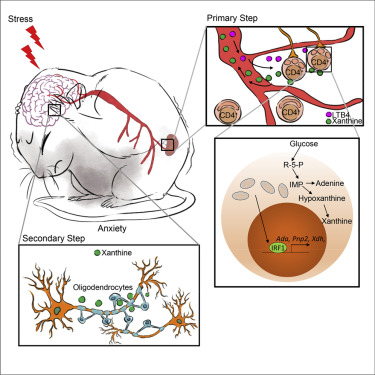Our official English website, www.x-mol.net, welcomes your
feedback! (Note: you will need to create a separate account there.)
Stress-Induced Metabolic Disorder in Peripheral CD4+ T Cells Leads to Anxiety-like Behavior.
Cell ( IF 45.5 ) Pub Date : 2019-10-31 , DOI: 10.1016/j.cell.2019.10.001 Ke-Qi Fan 1 , Yi-Yuan Li 1 , Hao-Li Wang 1 , Xin-Tao Mao 1 , Jin-Xin Guo 1 , Fei Wang 1 , Ling-Jie Huang 2 , Yi-Ning Li 1 , Xiang-Yu Ma 3 , Zheng-Jun Gao 1 , Wei Chen 4 , Dan-Dan Qian 5 , Wen-Jin Xue 5 , Qian Cao 2 , Lei Zhang 2 , Li Shen 1 , Long Zhang 1 , Chao Tong 1 , Jiang-Yan Zhong 1 , Wei Lu 5 , Ling Lu 6 , Ke-Ming Ren 2 , Guisheng Zhong 7 , Yuan Wang 4 , Mingliang Tang 5 , Xin-Hua Feng 1 , Ren-Jie Chai 3 , Jin Jin 8
Cell ( IF 45.5 ) Pub Date : 2019-10-31 , DOI: 10.1016/j.cell.2019.10.001 Ke-Qi Fan 1 , Yi-Yuan Li 1 , Hao-Li Wang 1 , Xin-Tao Mao 1 , Jin-Xin Guo 1 , Fei Wang 1 , Ling-Jie Huang 2 , Yi-Ning Li 1 , Xiang-Yu Ma 3 , Zheng-Jun Gao 1 , Wei Chen 4 , Dan-Dan Qian 5 , Wen-Jin Xue 5 , Qian Cao 2 , Lei Zhang 2 , Li Shen 1 , Long Zhang 1 , Chao Tong 1 , Jiang-Yan Zhong 1 , Wei Lu 5 , Ling Lu 6 , Ke-Ming Ren 2 , Guisheng Zhong 7 , Yuan Wang 4 , Mingliang Tang 5 , Xin-Hua Feng 1 , Ren-Jie Chai 3 , Jin Jin 8
Affiliation

|
Physical or mental stress leads to neuroplasticity in the brain and increases the risk of depression and anxiety. Stress exposure causes the dysfunction of peripheral T lymphocytes. However, the pathological role and underlying regulatory mechanism of peripheral T lymphocytes in mood disorders have not been well established. Here, we show that the lack of CD4+ T cells protects mice from stress-induced anxiety-like behavior. Physical stress-induced leukotriene B4 triggers severe mitochondrial fission in CD4+ T cells, which further leads to a variety of behavioral abnormalities including anxiety, depression, and social disorders. Metabolomic profiles and single-cell transcriptome reveal that CD4+ T cell-derived xanthine acts on oligodendrocytes in the left amygdala via adenosine receptor A1. Mitochondrial fission promotes the de novo synthesis of purine via interferon regulatory factor 1 accumulation in CD4+ T cells. Our study implicates a critical link between a purine metabolic disorder in CD4+ T cells and stress-driven anxiety-like behavior.
中文翻译:

应激诱导的外周CD4 + T细胞代谢紊乱导致焦虑样行为。
身体或精神上的压力会导致大脑神经可塑性,并增加患抑郁症和焦虑症的风险。压力暴露引起外周T淋巴细胞功能障碍。然而,尚未充分建立在情绪障碍中外周T淋巴细胞的病理学作用和潜在的调节机制。在这里,我们表明缺乏CD4 + T细胞可以保护小鼠免受应激诱导的焦虑样行为。物理压力诱导的白三烯B4触发CD4 + T细胞中的严重线粒体裂变,进而导致各种行为异常,包括焦虑,抑郁和社交障碍。代谢组学特征和单细胞转录组显示,CD4 + T细胞来源的黄嘌呤通过腺苷受体A1作用于左杏仁核的少突胶质细胞。线粒体裂变通过CD4 + T细胞中干扰素调节因子1的积累促进嘌呤从头合成。我们的研究暗示了CD4 + T细胞中的嘌呤代谢紊乱与压力驱动的焦虑样行为之间的关键联系。
更新日期:2019-11-09
中文翻译:

应激诱导的外周CD4 + T细胞代谢紊乱导致焦虑样行为。
身体或精神上的压力会导致大脑神经可塑性,并增加患抑郁症和焦虑症的风险。压力暴露引起外周T淋巴细胞功能障碍。然而,尚未充分建立在情绪障碍中外周T淋巴细胞的病理学作用和潜在的调节机制。在这里,我们表明缺乏CD4 + T细胞可以保护小鼠免受应激诱导的焦虑样行为。物理压力诱导的白三烯B4触发CD4 + T细胞中的严重线粒体裂变,进而导致各种行为异常,包括焦虑,抑郁和社交障碍。代谢组学特征和单细胞转录组显示,CD4 + T细胞来源的黄嘌呤通过腺苷受体A1作用于左杏仁核的少突胶质细胞。线粒体裂变通过CD4 + T细胞中干扰素调节因子1的积累促进嘌呤从头合成。我们的研究暗示了CD4 + T细胞中的嘌呤代谢紊乱与压力驱动的焦虑样行为之间的关键联系。











































 京公网安备 11010802027423号
京公网安备 11010802027423号